Helmand: Life after UK troop pullout
- Published
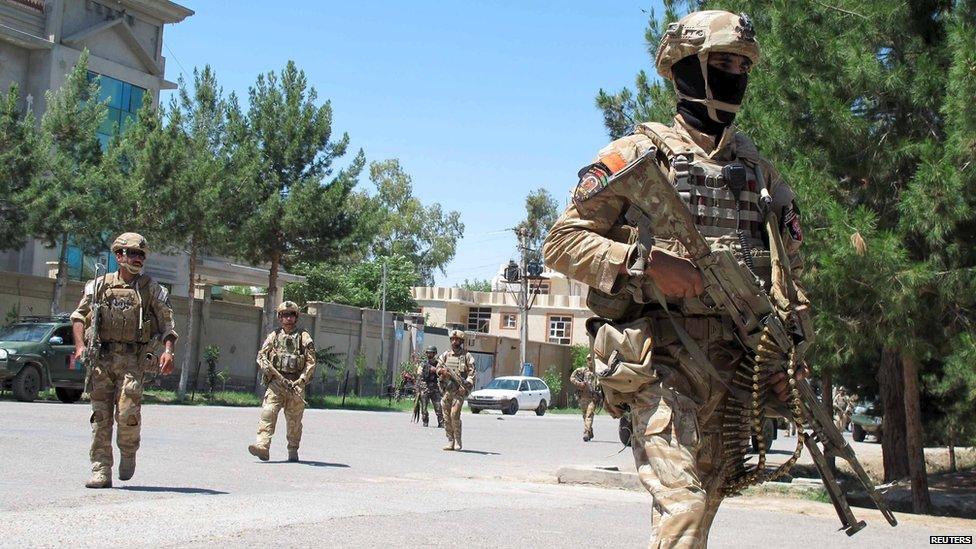
Afghan forces have been battling the Taliban since the British withdrawal
The Taliban have made substantial gains in Helmand province in southern Afghanistan since British and other international troops left at the end of last year.
No longer fearing attack from the air, they have mounted larger assaults and extended their influence into isolated towns in the north of the province, including Sangin and Musa Qala.
They have also continued to make it impossible to repair a hydroelectric power station at Kajaki. If that were operating at full capacity it would make a significant difference to living standards across the south.
Afghan forces ranged against them include locally employed police: among them the most unconventional commander in Afghanistan.
'Sistani warriors'
Ferozah is between 60 and 70 years old, but does not know her age. She never went to school, but took over command of a police unit at Sistani in Marjah province after her son was killed.
She has been given Afghanistan's highest award for a woman - the Malalai medal - named after a heroine in a 19th Century battle against the British.
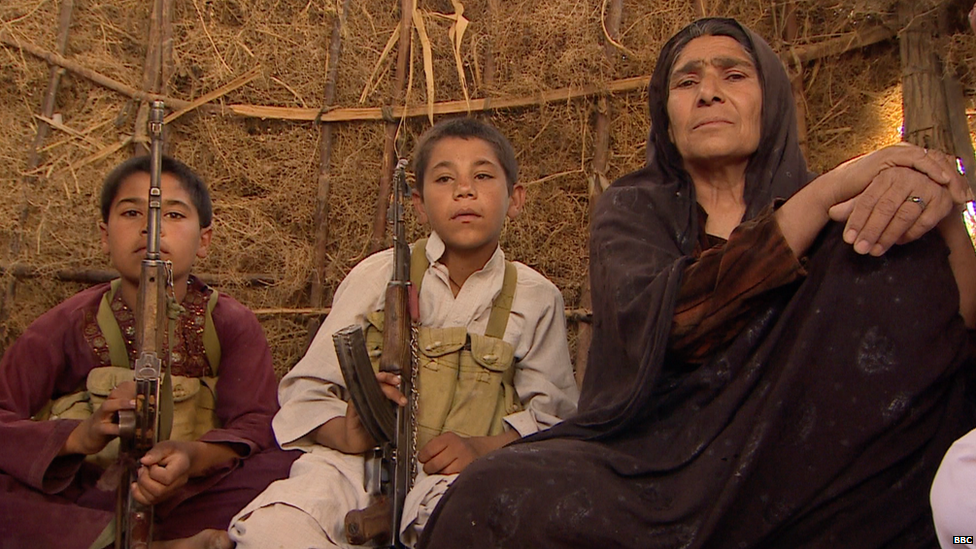
Ferozah and her young grandsons face a tough fight against the Taliban
Being a female military commander in a rural culture where women rarely work out outside the home is unusual enough. But there is more.
Two of Ferozah's grandsons, Faizal Mohammed, 13, and Sultan Mohammed, 14, fight alongside her. They are as quick as an experienced veteran at stripping down and reassembling a Kalashnikov rifle.
Ferozah said: "The Taliban keep taunting me, and saying 'what have you gained, you have even armed your grandchildren'. But the government is winning and they are losing."
She called them "Sistani warriors" who had already faced many battles against the Taliban. By any other name they are child soldiers, whose deployment breaks international law.
Sistani is on the front line between the densely populated central zone, where most people live, and the more sparsely populated areas north and south of it.

The Malalai medal was given to Ferozah as an acknowledgement of her work
Warning to British
That central zone on either side of the Helmand river is more stable than it was before international troops arrived.
Roads are far better and there are 75 health clinics, delivering basic services, where before there were none.
More than 190,000 children go to school in the province, around a third of them girls, and some schools are still open in Taliban areas - although, as in the health clinics, it is hard to recruit staff.
One reason for the success in delivering government services in parts of the Taliban-dominated countryside is because district councils, introduced by the British, are still operating.
Perhaps surprisingly, this rather dry sounding reform may turn out to be the one British legacy that makes a long-term difference. The introduction of these councils gave village elders a direct stake in how and where aid money was spent.
The local head of the Ministry of Rural Rehabilitation and Development, Mohammed Omar Khane, said that even in Garmsir, one of the more unstable districts, they were still implementing 52 projects.
"The local council spoke to the Taliban and said they needed the development."
But he said that when the British left, only half of the job was done.
"I would like to thank the British people and the British government. They implemented their projects and observed them very immaculately.
"But I have a warning for them too, that it you stop helping us, all of the systems left behind will be washed away."
Local traders 'ruined'
There is less aid flowing into Afghanistan than before, and the loss is keenly felt, especially as it comes at the same time as the departure of nearly all foreign forces. Economic growth in recent years turns out to have been a wartime bubble.
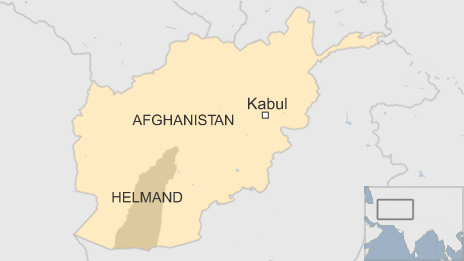
The shelves of shops in Lashkar Gah are filled with goods that traders had planned to sell to British forces.
Shopkeeper Jan Ali has been trying to persuade local people to buy breakfast cereals and other foreign products. But he knows he is not going to shift some items.
"Nobody here knows what pancake mix is," he said.
Like other traders he was surprised when foreign forces left, although the final departure date was clearly fixed and announced.
Afghan media have some part to play in this confusion. They fuelled a widely believed conspiracy theory that foreign forces would not actually leave.
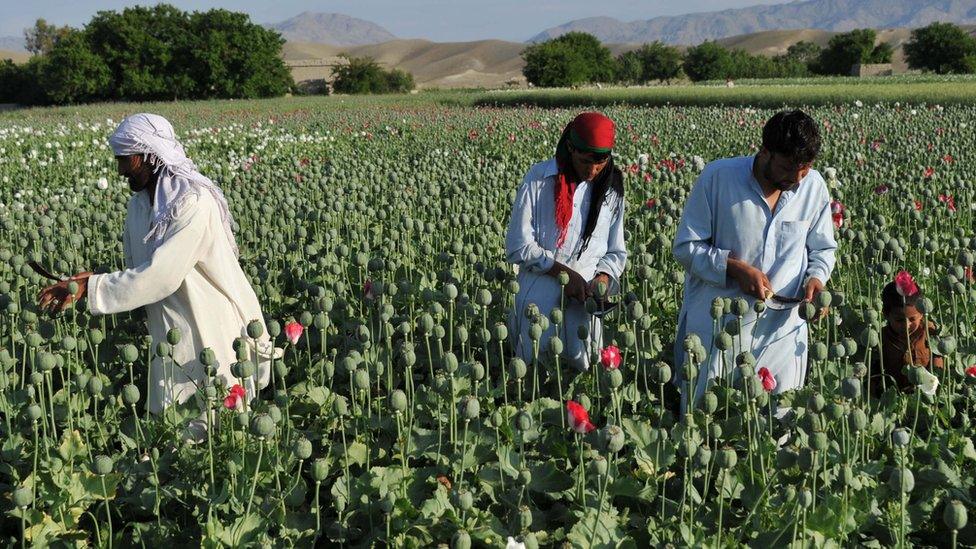
The abundance of raw opium in Helmand means drug abuse is a real problem
The impact of the departure has been felt beyond firms supplying the British base here.
Haji Nazir Ahmad closed his construction firm after the government failed to pay for building contracts he said he had delivered. He brought innovation to Lashkar Gah, including designing litter bins for the town.
He said the officials who ordered them "did not know what a bin should look like". So he made a sample.
Mr Ahmad invested millions of dollars in plant and machinery which is now lying idle and good only for scrap metal.
He has laid off 350 workers, and said that the social cost of that is significant, including family breakups and violence against women.
He said he believed that some of his former employees had joined the Taliban, and he had encountered one of his best workers in the street selling heroin.
Cheap drugs
The United Nations forecasts another record harvest of opium poppies in Afghanistan - the raw material for heroin, with Helmand again providing most of the crop.
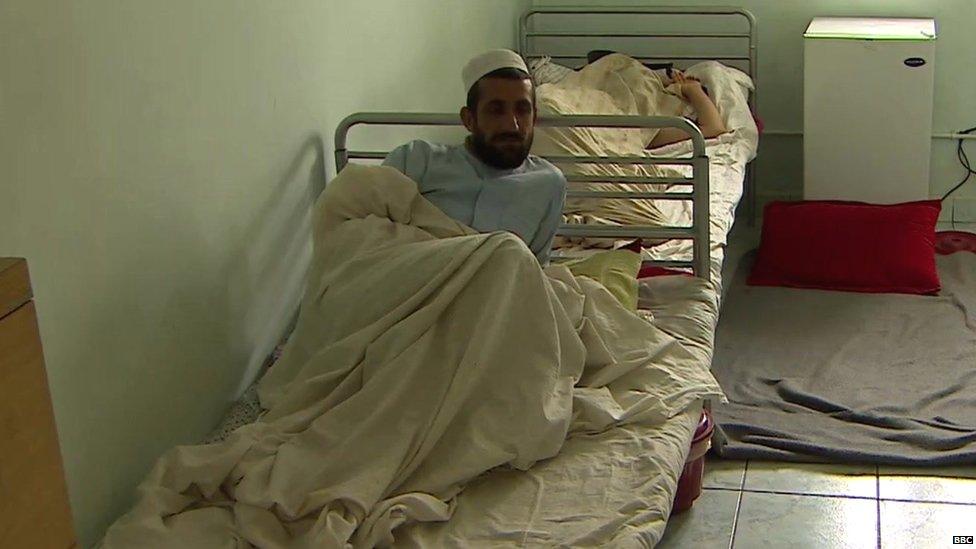
Many patients at the rehabilitation clinic will go back to drugs when they leave
The social impact on Helmand is disastrous. There are believed to be 110,000 heroin addicts in the province - a figure that represents a staggering 7% of the population. Addicts begging for food are a common site in the bazaar.
The main building in the former British headquarters in Lashkar Gah has been converted into a drug rehabilitation clinic. A room designed for a single British officer now houses three addicts who are in the centre for six weeks.
But it has capacity for only 50 patients, and continuing instability, unemployment and the availability of cheap drugs give the treatment a very low success rate.
Nine years of intense fighting by international troops did nothing to stop the production. In fact it only became worse.
The only difference was that it has been pushed out beyond the central populated zone to less governed badlands beyond the Helmand canal.